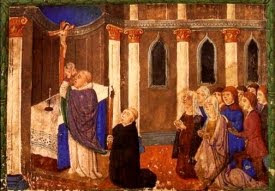I should begin by saying that I despise the term "Novus Ordo." It carries with it among Catholic traditionalists, certain pejorative associations, which I believe do a great injustice to what is, by all accounts, a legitimate form of the Sacrifice of the Mass, if one often done carelessly. And yet I have employed it here for certain less pejorative associations which it also carries, those which bespeak of mediocrity, of lukewarmness, in our devotion to the sacred liturgy -- in other words, for want of a better term, and with tongue firmly in cheek.
Tonight, as the Feast of All Saints is a holyday of obligation, and I am loathe to drive all over creation, even for my preference of the Traditional form of the Roman Mass, I visited a parish in northern Arlington to which I belonged some years ago. It has always been known as a "conservative" parish, and I was rather active there. I was an altar server on weeknights, before the pastor got a burr in his saddle and insisted that only young boys serve, no matter how late and unkempt they were. I was a reader, before a new pastor came along and decided to introduce the role of "commentator," who would introduce the Mass at the beginning, accompanied by some inane sermonette. Now, the role of commentator is mentioned in the General Instruction of the Roman Missal, but people usually misread its purpose there, and this pastor was no exception. But the priest wanted to "give laypeople something to do," and the coordinator of readers, who would have believed the earth was flat if a priest were to tell him so, went back on his agreement to leave me out of the rotation for this repugnant task. So I quit being a reader. The boys who served continued to appear one at a time on the altar after the Mass had already started, and young ladies in short skirts and the occasional go-go boots continued to read the Scriptures, as well as serve as "communion ministers."
Then, fortune smiled on me, and I moved to southern Arlington.
My canonical parish is in the hands of those who promote errors against the Faith (which I can prove to my bishop with vivid accuracy and detail, if he had ten minutes with nothing better to do), so I don't go there. I drive seven miles every Sunday to be a Master of Ceremonies (and as need be, a sacristan) for the Traditional Latin Mass. It is what I prefer, and a form of the Roman Mass which I appreciate more with each passing year; indeed, with each passing Sunday. But during the week, on such days as this, I don't always have it.
Tonight, the Mass was crowded with people who were unable to go to Mass on their lunch hour. The celebrant processed in with the entrance hymn, alone. The altar server eventually took his place over in the corner at some discreet moment during the readings. The homily, while not heterodox in any way, was of the variety that would be written by the specialist in greeting cards. It filled our minds, much as would a bag of potato chips would fill our stomachs. The altar server did the absolute minimum (God forbid he should ring any bells as they once did even while I was there), nobody held hands at the Lord's Prayer, there was an adequate showing of handshaking at the Sign of Peace, the ushers were all men, and the "communion ministers" were all women. In other words, nothing had changed in over a decade since I had left.
I had heard, about a year ago, that the pastor was considering altar girls. He wanted "to give the girls the same opportunity as the boys," one would imagine, to show up late and do as little as possible. Or perhaps they wouldn't be late. Perhaps, being more mature at the age common to altar service in a parish, they would do a much better job than the boys, as I rather expect they would. He probably learned that most of the boys would quit, if only out of intimidation, and that he would have traded an imaginary injustice for a real one. Thank goodness he thought the better of it.
And thank goodness he got rid of that ridiculous sermonette before the start of Mass.
Much is said about restoring the sacred to the liturgy. Indeed, the Holy Father has said much about it, and has engaged in what the good Father Zuhlsdorf has called a "Marshall Plan" to elevate the ars celebrandi of the "Novus Ordo Missae" (the term I prefer over that other one, by the way). The revised English translation has made a noticeable difference. But the Mass is an action performed, as opposed to a series of words and texts to be gotten through.
Someday the realization of that shortcoming will be "gotten through" to us -- Deo volente!



No comments:
Post a Comment